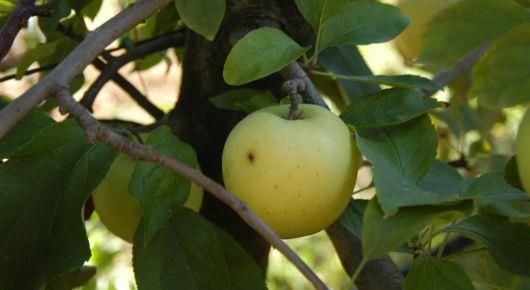FAO crop experiment sees lower pesticide use reap rewards in Turkey

An apple a day keeps the doctor away, so the saying goes. FAO, jointly with Turkey’s Ministry of Agriculture and Forestry, and other local partners, is helping to ensure Turkish consumers get their daily apple free of both pests and pesticides.
Sustainable and safe fruit production that fosters economic, social, and environmental sustainability has a special importance in 2021 – declared by the United Nations the International Year of Fruits and Vegetables.
But while plant health is essential for crop production, human health, and the environment, according to FAO statistics, the use of pesticides is increasing globally. Considering its negative impacts, it is important to reduce dependency on pesticides in agriculture, and to address the challenges such dependency causes. To this end, FAO supports sustainable crop production and provides alternatives to pesticides through the project ‘Lifecycle Management of Pesticides and Disposal of POPs Pesticides in Central Asian countries and Turkey’, which is funded by the Global Environment Facility (GEF).
As part of the project, and despite COVID-19 restrictions, in 2020 FAO carried out an experimental trial together with the Ministry of Agriculture and Forestry’s Fruit Research Institute, during which the benefits of low pesticide use in apple production through integrated pest management were compared to those of conventional apple production.
“The results of the trial were truly remarkable and definitely worth promoting among local apple producers,” said Tania Santivanez, FAO Agriculture Officer and the project’s lead expert. “There is a substantial difference in pest damage levels that mostly comes from high-level resistance of pests against pesticides in trial orchards.”
“More pesticides trigger more resistance and, in the end, no matter how much pesticide is used, the damage can still be enormous,” she added. “Therefore, alternative solutions to pesticides should be supported not only for the sake of human health and the environment, but also for food security.”
Based on last year’s results, the promotion of integrated pest management practices in apple orchards has continued in 2021 through the Isparta Young Businesspeople Association.
“Throughout the production season, beneficiary producers will be trained continuously on different aspects of integrated pest management, and increasing market chances of the low-input apple and its by-products,” explained Professor Ismail Karaca, Technical Team Leader of the Isparta Young Businesspeople Association.
“What we call ‘orchard days’ will be organised this summer to train another 80 producers by showing them the results. During this training, we will employ a comprehensive approach to create sustainable and economically viable apple production. Our ultimate aspiration is to raise awareness and mobilize local and national resources to improve apple production, and to address local environmental issues such as pesticides pollution.”
About the apple orchard trials
‘Integrated pest management’ is an ecosystem-based crop production and protection approach that combines different management strategies and practices to grow healthy crops with the minimum amount of pesticide use. It links together all areas and elements of crop production in a holistic manner.
During the 2020 trial in Isparta province, southwestern Turkey, pheromone dispensers were applied as mating disruptors to prevent the pest population from growing and causing damage. Compared to conventional practices, the use of pheromone was able to reduce the amount of pesticide needed against the codling moth (cydia pomonella) by 70 percent. In the trial orchard where pheromone dispensers were applied, all apples remained intact, whereas the rate of damage in the conventional orchard was 69 percent.
In April 2021, 30 local apple producers were trained in integrated pest management – including pheromone use in pest control – and received 75 000 single pheromone dispensers for the control of the codling moth in approximately 70 ha of apple orchards.
Isparta province produces about 20 percent of the apples consumed in Turkey.
31 May 2021, Isparta, Turkey
